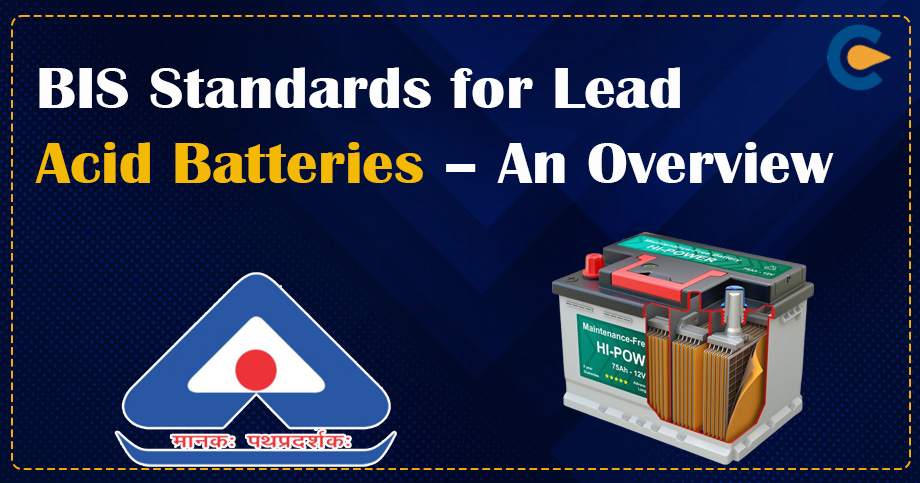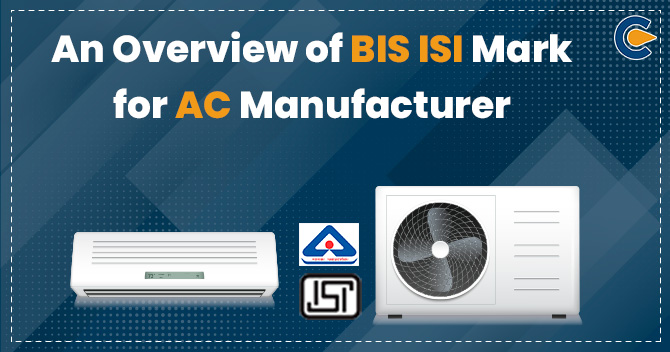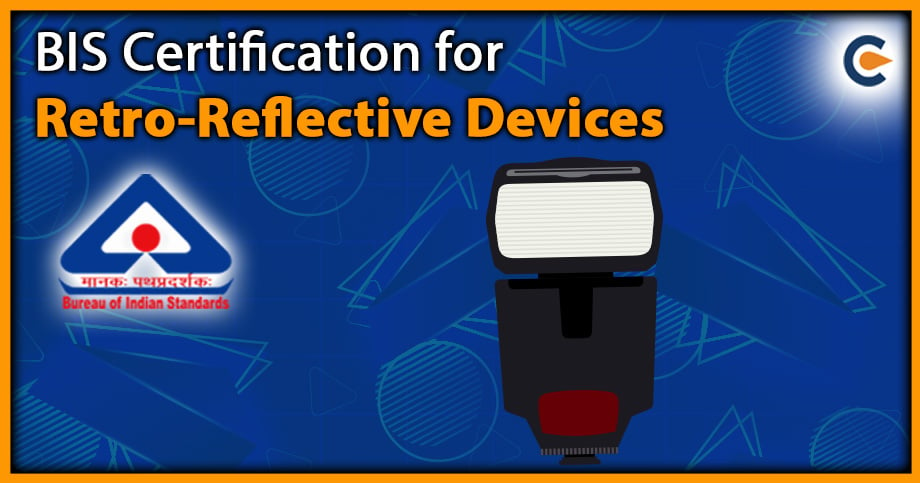In May 2019, the Standards and Quality Control Division of the Ministry of New and Renewable Energy published a notice announcing the introduction of mandatory BIS certification for solar PV modules, inverters, storage batteries, etc. The notification clarified that the Indian Standards IS-16270: 2014’s Storage Battery standards would apply to the BIS Standards for Lead Acid Batteries. These batteries are used in solar power projects that use solar photovoltaic systems. The Ministry has also announced that before storage batteries are produced or sold in India, they must be examined and registered under the BIS CRS scheme. Scroll down to check BIS Standards for Lead Acid Batteries.
BIS Compulsory Registration Scheme
Bureau of Indian Standards[1] or BIS is the national standards body of India is the According to the BIS Act 2016, the Bureau of Indian Standards (Conformity Assessment) Regulation, 2018 governs the Compulsory Registration Scheme (Scheme Il of Schedule Il). The program aims to boost the increasingly developing information technology and electronic industry in India. By employing this strategy, the Indian government has bridged the safety, technology, and human capital gaps and stopped dumping non-compliant goods.
The BIS certification program is voluntary in nature. However, the government has implied a rule that various products should be complied with according to the Indian standards to safeguard national security, the environment’s safety, public interest, and the health of people, animals, and plants.
The functions performed by BIS are listed below-
- Establishing and Disseminating Indian Standards
- Putting Conformity Assessment Schemes into Practice
- Praising laboratories for conducting experiments and tests
- Putting hallmarking systems in place
- Working to empower consumers
- Providing consumers with quality assurance
- India’s representation in ISO and IEC
Tests Required for Lead Acid Batteries
Lead Acid Batteries are divided into groups to send samples to a lab for testing because they vary in sizes, ratings, varieties, etc. A directive outlining the testing requirements for registering BIS Standards for Lead Acid Batteries has been released by the Standards of Quality Control Division of the Ministry of New & Renewable Energy. The following are the test requirements:
Material and Construction: The requirements listed below must be met to meet BIS Standards for lead acid batteries.
- The cells or batteries must be produced using high-quality raw materials and be free of any flaws that could impair their performance.
- For vented batteries, hard rubber, transparent SAN, fibre-reinforced plastic, or polypropylene must be used in the container. For sealed batteries, polypropylene co-polymer, acrylonitrile butadiene styrene, styrene-acrylonitrile, or any other acid-resistant plastic material must be used.
- The separators, sulphuric acid, water, and plastic containers used must meet the specifications outlined in Cl. 7.2 of IS 16270.
Battery Charging:
The manufacturer can suggest a method for charging the cells or batteries to the testing facility. If the customer does not want to provide the information, Cl. 7.2’s procedure will be applied. Variations in temperature and humidity can also impact the performance and life of the cells and batteries. As stated in Cl. 4.3.9 of IS 16270, the manufacturer’s recommendations regarding the operating temperature and humidity limits during battery testing must be followed.
Sampling and Sequence of tests:
A total of eight cells or batteries must be removed from the production batch for testing. The IS 13369/IS 1651 standards require that each pack of cells or batteries have the same nominal voltage, rated capacity, electrolyte composition, specific gravity, and overall dimensions. The outside cells or batteries must be permanently and indelibly marked with the source of manufacture, Ah capacity, year of manufacture, country of origin, and other information as per the applicable IS 13369/IS 1651 clauses.
Test of Sequence:
| Sr. No | Test Type |
| 1 | Physical Verification (Verification of Marking & Dimensions) |
| 2 | Capacity test @ C/10 Rate |
| 3 | Endurance test |
| 4 | Charge Retention Test |
| 5 | Cyclic Endurance in photovoltaic application |
| 6 | Sulphation Test |
| 7 | Water Loss Test |
Requirement:
According to the pertinent clauses of IS 16047(Part 3):2018/IEC 61960-3:2017 and IS16270:2014, the pass criterion must be strictly followed.
Selecting the Representative Model for Stationary Lead Acid Batteries:
All ratings included in the series must pass short-term tests (capacity, retention of charge, sulphation, and water loss). The specific rating must be resubmitted for testing if any test sample fails any short-term tests.
The sample with the highest capacity rating will undergo all testing, including endurance tests. All samples in the series will receive test results for the qualifying product.
For cells or batteries to be categorized as part of the same series, the manufacturer must provide an assurance to the test lab that no changes were made to the grid alloy composition, grid purity, grid thickness, ingredients used to prepare the electrodes, preparation methods, electrode thickness, or quality control procedures used to manufacture any of the models.
Note: Safety and other information to be provided by Manufacturer/Supplier for batteries used for Photovoltaic Applications
Documents required for BIS Certification for Lead Acid Batteries- BIS Standards for Lead Acid Batteries
Following are the crucial documents required for BIS Certification for Lead Acid Batteries:
- Completed CDF/CCL form
- Completed BIS application form.
- The manufacturing facility’s business license
- The Business License’s purview
- ISO manufacturer certification
- The product’s label or marking information
- Letter of authorization (If the signatory person is other than the head of the manufacturing)
- Test Results
- Certificate of Trademark
- Trademark Authorization letter (If TM is owned by other than the manufacturer)
- Evidence of a company’s authorized Indian representative status in India (in the case of the foreign manufacturer)
- Photo identification of the authorized signatory or Indian representative
- Product’s Technical Specification Sheet or User Guide
- Product Guide
Procedure to obtain BIS Standards for Lead Acid Batteries
The manufacturer must first apply for the BIS Standards for Lead Acid Batteries to obtain the BIS Certification for Lead Acid Batteries. The BIS Registration procedure for Indian manufacturers is different from a foreign manufacturer.
The procedure that a foreign manufacturer follows is:
- An Authorized Indian agent or AIR is appointed by the manufacturer to carry out all of his tasks on his behalf.
- The application for obtaining the certificate is submitted along with all required paperwork.
- The product sample is submitted to the BIS-approved laboratory for testing purposes.
- After the tests are performed in a BIS-approved laboratory, the manufacturer or AIR collects the test report and submits it to the BIS office for review.
- If the submission is made online, then the manufacturer or his representative must submit a hard copy of the application form accompanied by other details.
- The reports are checked and verified by the BIS office.
- The BIS office issues BIS Standards for Lead Acid Batteries to the manufacturer or authorized agent representative after verifying the information (AIR).
The procedure that an Indian manufacturer follows is:
- The application for obtaining the certificate is submitted along with all required paperwork.
- The product sample is submitted to the BIS-approved laboratory for testing purposes.
- After the tests are performed in a BIS-approved laboratory, the manufacturer collects the test report and submits it to the BIS office for review.
- If the submission is made online, then the manufacturer must submit a hard copy of the application form accompanied by other details
- The BIS office verifies and looks over the reports.
- After verifying the information, the BIS office issues the manufacturer BIS Standards for Lead Acid Batteries.
Conclusion
Under the BIS Compulsory registration scheme, manufacturers of lead acid batteries must obtain BIS Standards. Customers can have confidence in the product and be free from any risk to their health because the BIS certification guarantees the product’s safety and quality standards. According to BIS Standards for Lead Acid Batteries, the development has increased its credibility with end users. The BIS-certified products guarantee their highest quality and dependability, cut down on money wasted on inferior or incorrect products, and increase their sales in both domestic and foreign markets. The BIS certification also enables manufacturers to grow their businesses by taking advantage of numerous advantages. To understand the technical requirements of the entire process and to prevent any financial loss caused by the application’s rejection for even the slightest error, it is always advised to seek the assistance of a professional to obtain the BIS Standards for Lead Acid Batteries.
Read our Article:Detailed Overview of BIS Standards for Medical Devices













